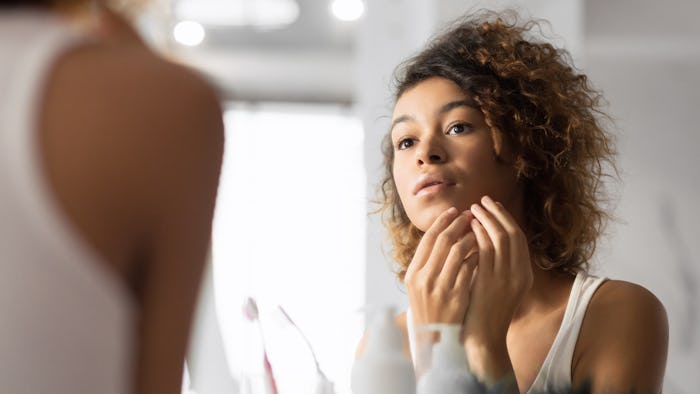Life

Here's Why You Always Break Out Around Your Period, According To Experts
If you’ve noticed that your skin starts to break out right before your period starts, you’re not alone. Even though it's common, you may still be wondering why your period causes acne and if there’s anything you can do to stop those annoying pimples (other than busting out the drying lotion and hoping for the best).
Acne that pops up right before your period is mostly related to hormonal shifts, though certain other factors may also be at play. “Hormonal fluctuations that occur throughout the menstrual cycle are a major cause of acne,” Dr. Holly Kanavy, Director of Dermatopharmacology at Montefiore Medical Center tells Romper. “Acne flares tend to occur in the week right before your period, when estrogen levels fall and progesterone and testosterone levels rise. These changes can trigger excessive secretion of sebum from the sebaceous glands in the skin,” she says.
Sebum is the clinical name for plain old oil on the skin. Humans need sebum to protect skin from losing moisture and drying out, per Healthline. However, too much of it can clog pores, resulting in break outs. “The oils on our skin are food for the bacteria, P. acnes, which is a main cause of acne,” Dr. Kelly Bickle, M.D., F.A.C.M.S, tells Romper.
Unfortunately, your period isn’t the only time when you’re more likely to experience acne. “Any major shift in hormones, such as those that occur during puberty, pregnancy, and menopause, can cause acne in susceptible patients,” Kanavy says.
Stress and diet can also contribute to acne flare-ups before and during your period. “PMS is associated with increased stress, which unfortunately worsens just about every skin condition, including acne,” Bickle says. So if the hormones alone weren't enough to cause acne, then add an increased sensitivity to stress during PMS (according to the findings of a 2017 study) and you have a perfect storm for acne to thrive. Fun. Getting plenty of sleep, exercise, and practicing relaxation techniques can be helpful in managing hormonal stress, Kanavy says.
There’s also a link between diet and acne, but you don’t have to swear off the chocolate you’re craving (at least not dark chocolate). Dairy naturally contains small amounts of hormones, including estrogen, which can slightly alter a person's hormonal levels. When it comes to aggravating acne, you may want to skip the skim latte because, “the worst culprit, believe it or not, is fat-free dairy,” Kanavy says
It can be helpful to follow a low-inflammatory diet before and during your period which includes lots of fruit and vegetables, healthy fats like avocado, protein, and anti-inflammatory herbs and spices like cinnamon, turmeric, and ginger, per Healthline. Kanavy recommends avoiding sweets, refined flour, and processed carbohydrates as “insulin spikes can trigger hormonal changes that can increase inflammation and oil production."
There are definitely ways to treat your acne at home; the main thing to remember is that consistency is key so you don't want to be switching products every week (even if the new skincare options at Sephora are calling to you). Bickle recommends cleansing twice daily, using a toner, moisturizer, and SPF, and looking for over-the-counter products that include benzoyl peroxide (which, be warned, will bleach your towels). Glycolic acid and salicylic acid are also available OTC and will help exfoliate and prevent pores from clogging.
"Retinoids are the most important part of [an acne treatment] regimen," Kanavy tells Romper. "These are vitamin A derived medications that increase the turnover of skin cells and prevent the pores from becoming clogged, stopping acne at its earliest stages." Just note that retinoids are not pregnancy-safe.
If you feel like your hormonal acne is getting worse or is resulting in deep, painful pimples (known as cystic acne) it's time to see your dermatologist or gynecologist. They may recommend a prescription topical ointment, or if it makes sense for your lifestyle, an oral antibiotic or even a contraceptive.
"A combined oral contraceptive pill containing both estrogen and progestin is a great way to control the hormonal fluctuations that cause breakouts," Kanavy says. "It’s important to note that some forms of birth control, such as IUDs (like Mirena), or an implant (such as Nexplanon), which release progestin only, can make acne worse."
While your period can cause acne (and a whole slew of other unfair side effects including anxiety and cramps, of course) you don't just have to grin and bear the monthly breakouts. There are ways to address hormonal acne at home, and your derm and your gynecologist are also there to help you find the best treatment for your specific needs.
Studies referenced:
Liu Q, et al.(2017). Stress reactivity and emotion in premenstrual syndrome. Neuropsychiatric Disease and Treatment Journal. doi: 10.2147/NDT.S132001
Experts:
Dr. Kelly Bickle, Board-certified dermatologist and fellowship-trained specialist in MOHS Micrographic Surgery
Dr. Holly Kanavy, Director of Dermatopharmacology at Montefiore Medical Center and Assistant Professor, Albert Einstein College of Medicine.